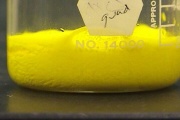Difference between revisions of "Lead iodide"
Jump to navigation
Jump to search
m (Text replace - "== Authority ==" to "== Sources Checked for Data in Record ==") |
|||
| (One intermediate revision by the same user not shown) | |||
| Line 1: | Line 1: | ||
| − | [[File:image5_leadiodide.jpg|thumb|Lead | + | [[File:image5_leadiodide.jpg|thumb|Lead iodide]] |
== Description == | == Description == | ||
| Line 8: | Line 8: | ||
lead (II) iodide | lead (II) iodide | ||
| − | + | == Risks == | |
| − | == | + | * Toxic by inhalation or ingestion. |
| + | * Noncombustible. | ||
| + | * Skin contact may cause irritation or ulcers. | ||
| + | * Carcinogen, teratogen, suspected mutagen. | ||
| + | * Fisher Scientific: [https://fscimage.fishersci.com/msds/88850.htm MSDS] | ||
| + | |||
| + | ==Physical and Chemical Properties== | ||
Soluble in concentrated alkalis, sodium thiosulfate and potassium iodide solutions. Slightly soluble in hot water and aniline. Insoluble in ethanol or cold hydrochloric acid. | Soluble in concentrated alkalis, sodium thiosulfate and potassium iodide solutions. Slightly soluble in hot water and aniline. Insoluble in ethanol or cold hydrochloric acid. | ||
| Line 23: | Line 29: | ||
|- | |- | ||
! scope="row"| Melting Point | ! scope="row"| Melting Point | ||
| − | | 402 | + | | 402 C |
|- | |- | ||
! scope="row"| Density | ! scope="row"| Density | ||
| − | | 6.16 | + | | 6.16 g/ml |
|- | |- | ||
! scope="row"| Molecular Weight | ! scope="row"| Molecular Weight | ||
| Line 32: | Line 38: | ||
|- | |- | ||
! scope="row"| Boiling Point | ! scope="row"| Boiling Point | ||
| − | | 954 | + | | 954 C |
|} | |} | ||
| − | == | + | ==Resources and Citations== |
| − | |||
| − | |||
| − | |||
| − | |||
| − | |||
| − | |||
| − | |||
| − | |||
| − | |||
| − | |||
* Thomas Gregory, ''The Condensed Chemical Dictionary'', Reinhold Publishing, New York, 3rd ed., 1942 | * Thomas Gregory, ''The Condensed Chemical Dictionary'', Reinhold Publishing, New York, 3rd ed., 1942 | ||
Latest revision as of 09:14, 7 October 2022
Description
A bright yellow powder that is made from the reaction of Lead acetate and Potassium iodide. Lead iodide is sensitive to light. Lead iodide is used for bronzing, gold pencils, Ormolu, printing, photography, and cloud seeding.
Synonyms and Related Terms
lead (II) iodide
Risks
- Toxic by inhalation or ingestion.
- Noncombustible.
- Skin contact may cause irritation or ulcers.
- Carcinogen, teratogen, suspected mutagen.
- Fisher Scientific: MSDS
Physical and Chemical Properties
Soluble in concentrated alkalis, sodium thiosulfate and potassium iodide solutions. Slightly soluble in hot water and aniline. Insoluble in ethanol or cold hydrochloric acid.
| Composition | PbI2 |
|---|---|
| CAS | 10101-63-0 |
| Melting Point | 402 C |
| Density | 6.16 g/ml |
| Molecular Weight | mol. wt. = 461.05 |
| Boiling Point | 954 C |
Resources and Citations
- Thomas Gregory, The Condensed Chemical Dictionary, Reinhold Publishing, New York, 3rd ed., 1942
- The Merck Index, Susan Budavari (ed.), Merck Research Labs, Whitehouse Station, NJ, 12th Edition, 1996 Comment: entry 5248
